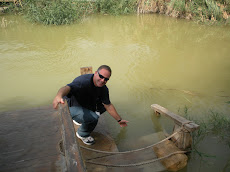Good Morning. In this week's edition of Revival Link, Dan Puckett asked if Americans should protest or pray as we approach election day.
"It is easy to get caught up in claiming and defending rights. The Declaration of Independence of these United States was based on certain assumed inalienable rights granted by the Creator. The claiming of those rights led to a revolt and the establishment of a nation unparalleled since the reigns of ancient kings who ruled with absolute authority.
There is some tension between what the Bible teaches and the patterns of defending and protecting a lifestyle. In the Old Testament, we see God as the mighty enabler and protector. God's people were ordered into battles and gained victory with the help of God. On an occasion when the people of Israel were journeying from Egypt to Canaan, the people of Amalek came against them in battle (Exodus 17:8). Moses assembled the men to go fight while he took the rod of God up on a hill. As long as Moses held his hands up, Israel prevailed. When the hands of Moses fell from weariness, the enemy prevailed. Aaron and Hur held up the hands of Moses and God routed the people of Amalek before them (Exodus 17:9-13).
Time and again we see in scripture that God used the sword to spread and enhance the kingdom of Israel, or at times God Himself empowered the sword of Israel's enemies to bring harsh judgment on His people.
There are promises and patterns in scripture that when God's people honor and obey Him, they are blessed, but when they rebel and forsake God, judgment comes.
So the question is, should we protest or pray?
One thing is clear: God is in control and He is active in setting up and putting down authority. The New Testament book of Romans declares in chapter 13, verses 1-2, "Let every soul be subject to the governing authorities. For there is no authority except from God, and the authorities that exist are appointed by God. Therefore whoever resists the authority resists the ordinance of God, and those who resist will bring judgment on themselves."
A protest held within the confines of the law is not rebellion, but would that same energy be better used in prayer? The Apostle Paul tells Timothy in 1 Timothy, chapter 2, verses 1-2, "Therefore I exhort first of all that supplications, prayers, intercessions, and giving of thanks be made for all men, for kings and all who are in authority, that we may lead a quiet and peaceable life in all godliness and reverence."
We know that in repressive regimes the gospel flourishes and multitudes come to Christ in salvation. Some of the most vibrant churches are those operating underground. We must never discount the power of God to accomplish His purpose in difficult circumstances.
Protest or pray? It seems in America that protests and the attendant undermining of authority have become part of the political process. It is not against the law of the land, but such practices may not serve the overall good.
There are good leaders and there are bad leaders. God does not distinguish; we are to pray for all of them. Go back to 1 Timothy, chapter 2. We are told to come before God with "supplications, prayers, intercessions, and giving of thanks for kings and all who are in authority." It is difficult to pour out your heart for a person one minute and publicly ridicule them the next. We all have our champions of rhetoric and we applaud them when they cleverly expose and put down leaders we do not like, but should we entertain such talk about someone we have just prayed for?
Protest or pray? Both! God has promised us in 2 Chronicles, chapter 7, verse 14, "If My people who are called by My name will humble themselves, and pray and seek My face, and turn from their wicked ways, then I will hear from heaven, and will forgive their sin and heal their land."
Cry out to God about wickedness, petition Him for mercy, and vote. That is the proper protest.
Wednesday, November 01, 2006
Subscribe to:
Post Comments (Atom)


No comments:
Post a Comment